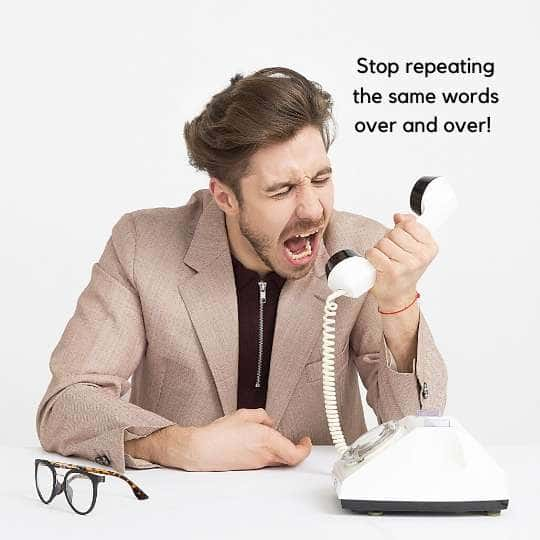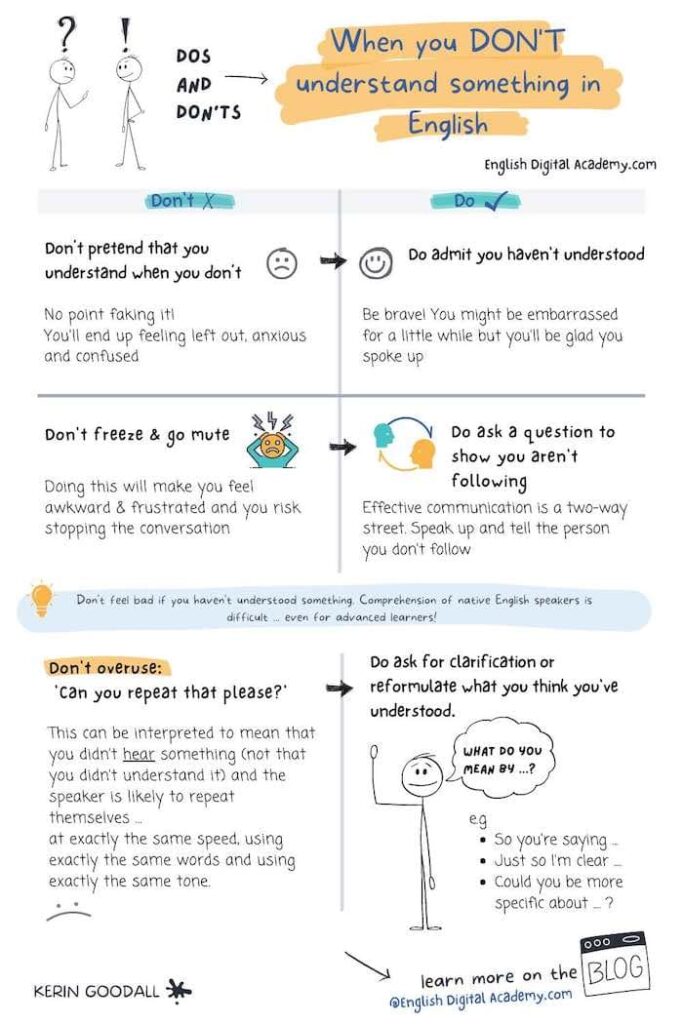In this lesson we’re looking at 3 common mistakes to avoid when you don’t understand someone who is speaking in English.
Do you sometimes struggle to understand native speakers?! Even the most advanced English learners can struggle to understand them. It’s nothing to be ashamed of – half the time, native speakers don’t understand other native speakers!
Here are 3 things that you should avoid doing when you don’t understand someone:
- don’t pretend that you understand when you don’t
- don’t go mute and end the conversation
- don’t overuse: Can you repeat that please?
READ ON FOR THE LESSON!
Read & Listen!
Comprehension of native speakers is difficult – even for advanced learners
My hubby, Enri was in London last week for work, to meet with an agency that his company uses. Now, Enri speaks proficiently in English; he’s extremely fluent and has a wide vocabulary and he even knows some Scottish words which is pretty impressive.
His listening skills on the other hand aren’t as strong as his spoken skills. We pretty much have the opposite thing going on – my comprehension in Italian is really strong, whereas my speaking not so much. And the reasons for this are varied (and that’s another story!)
I digress … he comes back from London tired and, let’s be honest, a little grumpy*. I asked what was up, and he said that he and his colleagues, who are Swiss and Italian, had had a real struggle* understanding the English guys during the meeting. I asked what the main problem had been, and he said the main thing for him, was speed. Whereas, his colleagues, who are not married to a Scottish English teacher, were also finding the vocabulary and informal expressions that the native speakers were using, really hard to understand.
*grumpy = bad-tempered and irritable
*struggle = fight, difficulty
Don’t understand? It happens to ALL of us!
I think no matter* how strong your English level is, there will always be times when you don’t understand something that is being said. It happens between native speakers all the time. Maybe we didn’t hear properly, or maybe we just don’t understand what the person is getting at.*
*no matter = regardless of
*to get at = to imply
When not understanding causes ANXIETY
That said, one of the biggest problems my students face is when not understanding is anxiety. Probably more so in professional situations, at work. However, if you are shy like I am, it’s possible that even in social situations, not understanding can cause you stress or anxiety.
This lesson is going to look at three common mistakes that we make and I want to show that these reactions to not understanding are ineffective and unhelpful when you are in this kind of situation.
And if you learn not to do them, it will help keep the anxiety to a minimum.

Read & Listen!
1. Don’t nod and smile and sit there feeling left out* of the discussion
*to feel left out = to feel excluded
Let me tell you a story – many many years ago, I was at a dinner party with my boyfriend, and his friends. All the group were Italian, I was the only foreigner, and I probably had an A2 level of Italian at that time -so pre–intermediate. I could follow simple discussions and I could speak in a simple way, and I was able to join in somewhat.
What happened was, at a certain point of the conversation they started talking ‘polizia’ which means police in Italian. But you see I was getting more and more puzzled, because they kept repeating this word…but in the context of the conversation ….polizia…blfhfjahfjf….polizia …jdsjkghksgj…. It just had no sense – and I really couldn’t understand why everyone was laughing.
So I just laughed along, nodded my head, smiled, ahahahhah…. But inside I was feeling left out and maybe a little bit stupid. By the time I had formulated my question in my head because I wanted to say, What does ‘police’ have to do with this story?…by the time I plucked up the courage* to ask this, the conversation had already moved on and it was too late to bring it up again, and return to that point.
*to pluck up (the) courage = to force yourself to be brave
Now, it upset me because I am a shy person, I didn’t feel confident with my Italian… but what had upset me the most wasn’t that I hadn’t understood… it’s that I hadn’t spoken up. I didn’t have the confidence to say ‘I’m lost, I don’t understand’.
In the car after dinner I asked Enri, what that story was all about …. Ah?! No, no no ‘pulizia! – cleaning- ahhhhhh not ‘police!’….
Ok! …. that made sense!
So what SHOULD I have done?
I could have simply said ‘polizia???’ –And the answer would have been: ‘No! ‘Pulizia!!!’ and maybe everyone would’ve giggled … I might have been embarrassed for a second…. but the conversation would have gone on, I would have been included and it wouldn’t have been a big deal.
Now… depending on the context or the environment you’re in, maybe it’s not such a big deal if you don’t understand every single story. Especially being in the company of friends, a social gathering, at dinner – like my example, or down the pub….. Maybe the important thing is being part of the social group and having fun.
At work we can’t afford NOT to understand
It is a horrible feeling when you think you have misunderstood something, when people have expectations of you but you aren’t sure about something because you couldn’t understand, if you act on something that you’re not sure about it could be potentially be a disaster.
Therefore, the next time you are in this situation, speak up and admit that you are not following. Don’t sit there and pretend that everything is ok. A little bit of embarrassment if better than a big bout of anxiety!
Master how to have successful conversations in stressful situations …
even when you don’t understand the English!
Read & Listen!
2. Don’t freeze up and go mute

In this scenario you are like a rabbit in headlights – this expression means that you are so frightened or surprised that you can’t move and you can’t think – you have that expression and you freeze.
This happens when you don’t understand something and you’re probably already feeling a bit nervous. So maybe you’re speaking to a native English speaker, who is speaking really fast, or maybe they have an accent that you’ve never heard before and you can’t understand the words.
What can happen in this situation is that you are asked a question – you don’t know what to say – you freeze – and the conversations stops – it’s awkward and you feel like an idiot. Has this ever happened to you? It’s happened to me more times than I’d like to admit. So how do we deal with it?
Communication is everyone’s responsibility
The first thing to remember is that communication is everyone’s responsibility. It isn’t 100% your responsibility to understand – it’s also the speaker’s job to make himself or herself understood.
This is an essential mindset change that can help communicate more effectively.
Native speakers can be clueless!
Clueless means unaware, insensitive. Imagine yourself in the speaker’s shoes. Let’s say you are from the UK and you talking to the real you at the coffee machine – maybe you’re chatting about what you did at the weekend or something like that. So the UK version of you hears the real you speak English. You seem pretty fluent! The UK version of you is completely insensitive to what it’s like speaking in a foreign language, because you are used to the world speaking in English to you.
In fact, the majority of native speakers don’t speak a second language … yep, I studied French at school for all of three minutes, but in a non–communicative way and I’m lucky if I can still remember one or two words in French. In fact, going a bit further – most of us are not even aware of our own language. I will bet you money if you ask a regular English person to explain the present perfect or ask them what a phrasal verb is …. the majority of them won’t know. We don’t learn English grammar properly at school.
Therefore, for whatever reason; arrogance, ignorance, whatever the reason; it is likely that the person you are speaking to doesn’t understand that you are struggling to understand. They hear you speak some English and they presume that you are fluent.
Consequently, by putting yourself in his shoes right or wrong – it could be weird for that person, if you suddenly go mute. He is probably going to think you are a bit strange, or rude.
This is where we come back to communication being a two-way street. Sometimes you need to tell people what’s going on in your head! You need to communicate that you don’t understand.
And it is ALWAYS okay to admit it. So the lesson is, instead of freezing – make the person you are speaking to aware. Again, there are many ways to do this, and you’ll find lots of examples in the guide, but for now, it’s enough to say a simple smile and a little apology can go a long way:
– I’m sorry I don’t understand.
-I’m not following, could you speak a bit more slowly please?
Moreover, the reaction of a normal person will probably be, Oh yes, sorry! Of course!
Now, I want you to think about these questions: Have you ever felt like a rabbit in headlights when speaking English? Have you ever frozen and gone mute? What happened? Were you able to continue the conversation or did the conversation end there? What could you do differently next time?
Feel free to leave any thoughts in the comments.
Read & Listen!
3. Don’t overuse ‘Can you repeat that please?’.

I know this will be controversial, but I think this is probably one of the most ineffective phrases in English!
Now don’t get me wrong – if I’m having a face-to-face conversation, one-to-one, or even in a small group, and I say ‘Can you repeat that please?’ the chances are that you’ll see from my face, that I haven’t understood. So sometimes it does work.
If however you are in a larger meeting, so more people, a bit of chaos perhaps, noise or you’re on the phone, or on a conference call …
It rarely works! Why not?:
These phrases: Can you repeat that? or I’m sorry, I didn’t catch that. or Can you say that again? can be interpreted to mean that you didn’t hear something, not that you didn’t understand it.
The speaker is likely to repeat themselves at exactly the same speed, using exactly the same words and using exactly the same tone.
Now if you didn’t understand because there are words in there you don’t know and you can’t get it from the context – you’re not going to magically understand it the second or the third time round. It’s like my ‘polizia’ story from point number 1. They kept saying that word over and over -… and I kept misunderstanding it over and over.
In a business context, what happens? You ask someone to repeat, they do, you still don’t understand, maybe you ask them to repeat again, same thing happens and you can be left still unclear about the meaning. There’s only so many times you can say ‘can you repeat‘ and of course in the moment, you can start to feel a bit frustrated, maybe a bit nervous. Effectively the communication breaks down.
Therefore, it’s much more effective to reformulate or to ask for clarification and so on. If you do want them to repeat exactly what they said, you could ask them Can you repeat that more slowly please?
You can learn more about how to reformulate, how to use this technique, in our Masterclass: manage conversations in stressful situations
Conclusion!


Ps. Want to improve your English and move towards English proficiency? Discover all my courses here

This lesson is so comforting!! Thank you so much for focusing on this because we, non-english speakers, make a big effort, invest years learning a second language and I find it great that you mention that sometimes native speakers don´t realize they´re not being clear. They just take for granted that people speak English, even if they are vising my country, where spanish is spoken. After so many years studying English is a little bit frustrating not being to understand. Still, I love English!!
I am so glad you found this useful Carla.
I agree, I think it is so important to be aware of things from another point of view.
This lesson helps me to have more self-confidence and not to feel like an idiot when I don’t understand something. I was in America years ago visiting friends (a married couple). With him I could discuss for hours without any problems. He spoke a good understandable English with a rich vocabulary. He explained why: he worked for an international company and had 18,000 people under his command from all over the world. So he had to acquire a good understanding of English. His wife, on the other hand, spoke a colloquial and idiomatic language, and I was reluctant to talk to her because I often did not understand her.
I’m so glad you’ve found this useful Gabriela. It’s an amazing experience when you find people who have the sensitivity and awareness to adjust their language for their audience.
While reading through this precious tips of yours, some memories came to my mind..
After a very few days from my graduation, I started working for a publishing hous, and the very first day my “super nice” colleague handed me the phone while I had no idea of who was the person at the other side and, most of all, what was I supposed to say to him/her. Someone started to speak in English, but to me sounded Arabic, and the only thing I was able to mutter was: “Sorry, I can’t hear you, I’ll call you back”, just to take time.. And my colleague stood there, just in front of me, with a sort of grin on her face, as she happily realised she was not the only one having trouble in understanding native English speakers..
Ahahaha! Love this story Simona! Yeah, I have many more memories of similar stories and “super nice” people!
It’s a very useful lesson! I think we all go mute sometimes, not just in English. Communication in any language is a two-way process, requires clarifications, asking questions, etc.
Thank you for the good tips&tricks!
Absolutely Zeljka, a two-way process!
You’re very welcome.